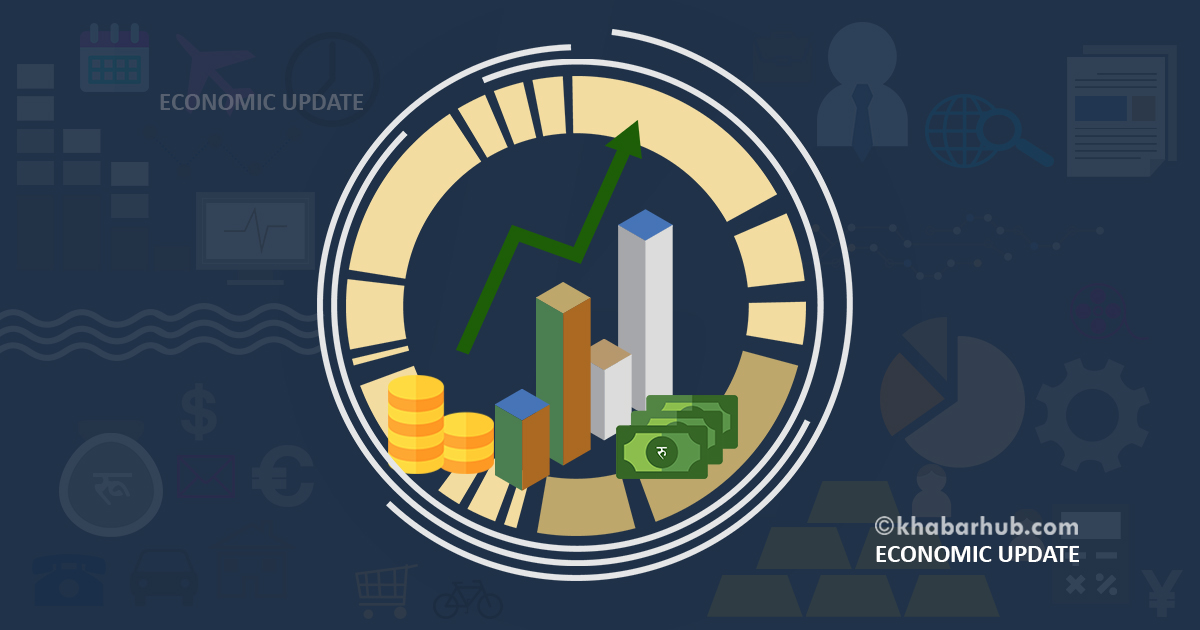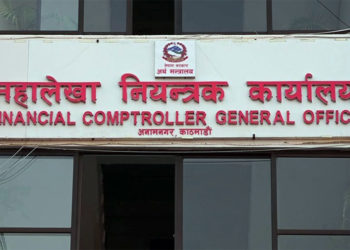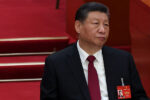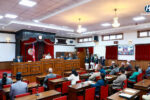KATHMANDU: Economic Digest offers a concise yet comprehensive overview of significant business happenings in Nepal, presented in easily digestible summaries.
The Nepal Stock Exchange (NEPSE) on Thursday saw a significant gain of 41.43 points, reflecting continued market momentum, while gold prices surged amid global fluctuations.
Economic activities remained dynamic, with Nepal securing Rs. 4.83 billion from carbon trading and India agreeing to supply an additional 600 MW of electricity.
However, concerns over rising bad loans in the banking sector, a growing trade deficit with Bangladesh, and blacklisted borrowers highlight financial vulnerabilities.
Meanwhile, policy discussions on budget planning and power purchase agreements signal ongoing economic restructuring, while the International Women’s Trade Expo underscores Nepal’s push for female entrepreneurship and local business growth.
NEPSE advances by 41.43 points
The Nepal Stock Exchange (NEPSE) climbed 41.43 points (1.58%), closing at 2,663.30, extending its gains following a 39.13-point rise in the previous session.
The index fluctuated between 2,621.46 and 2,666.17, with a trading volume of Rs. 5.22 Arba across 55,442 transactions involving 309 companies. Himalayan Reinsurance Limited (HRL) led the turnover at Rs. 51.18 Crores, closing at Rs. 1,020.10 per share.
Gurans Laghubitta Bittiya Sanstha Limited (GLBSL) saw the highest gain, rising 10%, while Kumari Sabal Yojana (KSY) recorded the steepest decline at 1.82%. Among sectors, the Trading Index led with a 6.09% increase, whereas the Mutual Fund Index had the smallest rise at 0.37%.
Gold prices surge by Rs. 1,300 per tola
Gold prices in Nepal climbed by Rs. 1,300 per tola to Rs. 174,800, while silver rose by Rs. 30 per tola, reaching Rs. 2,020. Market fluctuations and global trends continue to impact precious metal rates.
Finance Ministry engages 16 ministries in budget planning discussions
The Ministry of Finance held deliberations with 16 ministries regarding the budget for the fiscal year 2082/083 BS.
During a session with the Ministry of Culture, Tourism, and Civil Aviation, Finance Minister Bishnu Prasad Paudel emphasized policy reforms over sheer budgetary figures.
He underscored the significance of federalism, the roles of different government tiers, and the transfer of federal programs to local levels. Paudel urged ministries to focus on impactful projects, avoid minor ones under Rs. 3 million, and submit realistic proposals for a more effective budget framework.
Birgunj imports exceed Rs. 390 billion in eight months
Imports through Birgunj Customs surpassed Rs. 390 billion in the first eight months of the current fiscal year, reflecting an 11.40% increase from the previous year. Petroleum products topped the list at Rs. 122 billion, followed by raw soybean oil (Rs. 29.29 billion) and iron materials (Rs. 22.51 billion).
Machinery imports amounted to Rs. 21.67 billion, while motor vehicle imports totaled Rs. 11.68 billion. Chief Customs Administrator Dipak Lamichhane attributed the growth to rising demand for fuel, vehicles, and industrial materials.
India to provide Nepal with an additional 600 MW
Starting April 1, India will supply an extra 600 MW of electricity to Nepal during peak evening hours (6 PM to 11 PM) through the Dhalkebar-Muzaffarpur transmission line.
This addition supplements the existing 1,004 MW provided during daytime solar hours. Energy Minister Khadka reassured the public of uninterrupted electricity supply, dismissing rumors of power cuts.
The decision follows Nepal’s request to address seasonal shortages, with officials lauding India’s support as crucial for energy security.
Surge in blacklisted bank customers amid loan repayment struggles
Nepal’s banking sector has seen a sharp rise in blacklisted individuals due to unpaid loans, with 37,523 people added to the list in the first eight months of the current fiscal year, up from 33,276 last year.
Over the past seven years, blacklisting numbers have skyrocketed from 1,310 annually in 2075 B.S. to over 37,000. With more than 110,000 people now on the blacklist, experts warn that without timely intervention from the government and regulatory bodies, liquidity and profitability issues in the banking sector could worsen.
SC to review leadership dispute between Ghising and Shakya at NEA
The Supreme Court will hear petitions filed by both Kulman Ghising and Hitendra Dev Shakya regarding Nepal Electricity Authority (NEA) leadership. Ghising challenges his dismissal as unlawful and seeks reinstatement, while Shakya demands compensation for what he claims was an unjust transfer.
The initial hearing is set for Friday. The dispute dates back to 2021 when Ghising replaced Shakya, sparking prolonged legal battles.
NEA greenlights 5,000 MW PPAs
Under newly appointed Executive Director Hitendra Dev Shakya, the Nepal Electricity Authority (NEA) approved Power Purchase Agreements (PPAs) for 5,000 MW.
The Board also released a white paper on NEA’s financial standing, introduced a 50% electricity discount for low-income households, and announced plans to import power from India to prevent shortages.
The initiative aims to allocate power capacities across hydropower projects and address future energy demands.
NRB conducts on-site inspections of 19 commercial banks
In the previous fiscal year, the Nepal Rastra Bank (NRB) conducted on-site inspections of 19 commercial banks. A report from NRB’s Banking Supervision Department outlined inspections carried out quarterly, covering institutions such as Rastriya Commercial Bank, Sanima Bank, and Nepal SBI Bank.
Additional inspections included Machhapuchchhre Bank, Siddhartha Bank, and Everest Bank in later quarters. Certain banks, including Nabil Bank, Nepal Investment Mega Bank, and Laxmi Bank, underwent special supervision.
Karnali Development Bank’s bad loans exceed 60%
Karnali Development Bank’s non-performing loans have surged past 60% as of mid-January 2025, prompting Nepal Rastra Bank to intervene and oversee management. Janaki and Pokhara Finance are also facing financial crises, with Janaki’s capital adequacy ratio at -0.16% and Pokhara’s at -3.08%, while their bad loans stand at 40.89% and 33.44%, respectively. The central bank is closely monitoring their financial health.
Nepal earns Rs. 4.83 billion from carbon trading for green energy projects
Nepal has secured Rs. 4.83 billion from carbon trading, as announced by Nawa Raj Dhakal, Executive Director of the Alternative Energy Promotion Centre (AEPC).
The funds will be directed toward sustainable energy initiatives, with a focus on providing solar energy to marginalized communities. Energy Minister Deepak Khadka highlighted the significance of Nepal’s Energy Development Guideline and Renewable Energy and Energy Efficiency Bill in this effort.
Nepal’s trade deficit with Bangladesh grows to Rs. 2.97 billion
In the first eight months of the fiscal year, Nepal imported Rs. 2.97 billion worth of goods from Bangladesh, with raw jute accounting for Rs. 1.6 billion.
In contrast, Nepal’s exports to Bangladesh stood at Rs. 276.85 million, consisting mainly of herbs, household goods, and animal feed. Given the trade imbalance, experts suggest increasing electricity exports as a potential solution.
Employee unions raise concerns over NEA’s power purchase and discount policies
Two employee unions at the Nepal Electricity Authority (NEA) have voiced concerns over recent power purchase agreements (PPAs) and electricity discount decisions.
The unions argue that opening PPAs for 4,800 MW without a thorough financial risk assessment could be problematic. They also criticized the 50% discount for domestic consumers using up to 20 units, citing a lack of government compensation for such subsidies. They urged the government to provide financial backing to prevent instability in NEA’s cash flow.
8th International Women’s Trade Expo 2025 opens in Lalitpur
The Federation of Women Entrepreneurs’ Associations of Nepal (FWEAN) inaugurated the 8th International Women’s Trade Expo 2025 in Lalitpur on March 27.
Prime Minister KP Oli officially launched the event, which recognizes notable figures such as Anuradha Koirala and Prem Kumari Pun for their contributions. Featuring 72 district associations, the five-day expo promotes local businesses under the theme “Eat Local, Wear Local, and Support Local Entrepreneurship.”
PM Oli highlights women’s role in economic progress
Addressing the International Women’s Trade Expo, Prime Minister KP Sharma Oli stressed the importance of women’s participation in national development.
He criticized obstacles to progress, noting that 97% of Nepal’s population still lacks electricity access. Oli commended young entrepreneurs for embracing technology and encouraged women to pursue business ventures.
TIA runway repairs to proceed without flight disruptions
Tribhuvan International Airport (TIA) will carry out taxiway repairs from April 1 without disrupting flights. Meanwhile, Air India Express and SpiceJet will introduce new routes, with Cathay Pacific increasing its flight frequency.
NRB establishes digital finance innovation hub
Nepal Rastra Bank has launched a Digital Finance Innovation Hub to support financial technology startups.
The initiative aims to provide regulatory guidance, foster innovation, and address policy challenges in the evolving digital finance landscape.
SEBON introduces new M&A directive to support brokerage firms
The Securities Board of Nepal (SEBON) has introduced a merger and acquisition directive to assist brokerage firms in meeting capital requirements.
With the fiscal year 2025/26 deadline approaching, 38 brokerage firms have yet to meet the mandatory capital threshold. Some are opting for mergers, while others are using reserve funds to issue bonus shares.









Comment